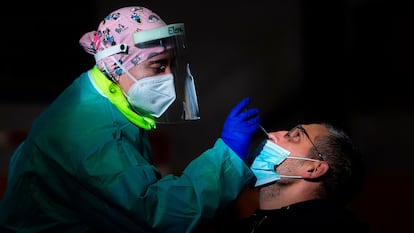Coronavirus incidence rate in Spain drops to levels not seen since end of August
The 14-day cumulative number of cases per 100,000 inhabitants has fallen to 189 but remains far from the government’s goal of 50


After reaching “elevated” levels, the incidence rate of the coronavirus in Spain is now in a “downward phase.” That’s according to Fernando Simón, the director of the Health Ministry’s Coordination Center for Health Alerts (CCAES), who reported the latest coronavirus figures at a press conference on Thursday evening. The 14-day cumulative number of cases per 100,000 inhabitants fell below 200 for the first time on Wednesday, when it stood at 193. According to the latest data, the incidence rate has now dropped to 189, a figure not seen since the end of August.
The Health Ministry reported 7,955 new coronavirus cases and added 325 deaths to the official toll
Although the incidence rate is clearly on a downward trend, Simón warned: “We can’t let that fool us: it is not a good situation.” Spain is still a long way off from reaching the government’s goal of lowering the 14-day cumulative number of cases per 100,000 inhabitants to 50, and there is concern the festive season could lead to a new rise in cases. “We cannot allow ourselves to relax,” said Simón.
According to the Health Ministry report published on Thursday, 7,955 new coronavirus cases were registered, bringing the total number of infections since the beginning of the pandemic to 1,720,056. The report added 325 Covid-19-related fatalities to the official toll, which now stands at 47,344. But according to the National Statistics Institute, 45,684 people died from Covid-19 between March and May alone. This figure includes fatalities that were confirmed with a diagnostic test (32,652 people) and those who had symptoms compatible with the disease (13,032), according to statistics. The Health Ministry’s death toll only includes victims whose coronavirus diagnosis was confirmed by a PCR test. During the first wave of the pandemic, a shortage of tests meant that thousands of people died from the disease without being tested, and they were not included in the official toll.
The data from Thursday’s report also indicates that the pressure on Spain’s hospitals and intensive care units (ICUs) is going down, albeit at a very slow rate. Covid-19 patients currently occupy 22.44% of all ICU beds, meaning that more than one in five ICU beds is taken up by a coronavirus patient. Two weeks ago this figure was close to 30%. But while the occupation rate has clearly improved, Simón warned the situation is far from positive. “Having 22% of beds occupied by just one disease continues to be a huge amount,” he said. According to the latest report, Covid-19 patients occupy 9.64% of all regular hospital beds, but this figure is more than double in some regions, like Asturias, where the occupation rate is 19.77%. Hospitals in Galicia, Extremadura and Murcia are under the least pressure in Spain, with coronavirus patients occupying 4%, 5.4% and 5.9% of all hospital beds, respectively.
Home testing and vaccines
Over-the-counter coronavirus test kits that detect whether an individual has developed antibodies to the virus are set to be approved for sale shortly in pharmacies. This diagnostic tool, however, will only be available with a doctor’s prescription. These tests are different from the antigen tests that the Madrid and Catalan regional governments want to allow to be carried out in pharmacies. While antibody tests indicate whether a person has had the virus, an antigen test detects an active infection.
In the case of antibody tests, Simón warned: “They may be sold, but I personally, and other doctors, are not in favor. There are scientific associations that have already identified the risks we will face if antibody testing becomes widespread.”

The health official also highlighted the problems with allowing antigen tests to be done in pharmacies. “It is possible that symptomatic people will go to get tested,” he explained. “The pharmacy has to have a separate area for other clients, staff need to have the necessary protective equipment, and if a person tests positive, they can’t simply go home, the health authorities must be notified and and there has to be a follow-up.” He warned that the tests could also lead to false negatives as the “sensitivity is very low on people who have had symptoms for five days or who have no symptoms.”
Simón said that it was “unlikely” that the 14-day cumulative number of cases per 100,000 inhabitants will fall to 25 or 20 by January, when Spain’s coronavirus vaccination drive is set to begin. This figure, he said, “would be a very favorable starting point to stop a third wave.”
With respect to vaccinating people with a history of serious allergies, Simón said the decision would be based on the criteria set by the European Medicines Agency, which is expected to approve the first coronavirus vaccine by December 29 at the latest. The health official added that the vaccination strategy is still being worked on, explaining that some decisions cannot be made until it is known exactly how many doses Spain will receive.
English version by Melissa Kitson.
Tu suscripción se está usando en otro dispositivo
¿Quieres añadir otro usuario a tu suscripción?
Si continúas leyendo en este dispositivo, no se podrá leer en el otro.
FlechaTu suscripción se está usando en otro dispositivo y solo puedes acceder a EL PAÍS desde un dispositivo a la vez.
Si quieres compartir tu cuenta, cambia tu suscripción a la modalidad Premium, así podrás añadir otro usuario. Cada uno accederá con su propia cuenta de email, lo que os permitirá personalizar vuestra experiencia en EL PAÍS.
¿Tienes una suscripción de empresa? Accede aquí para contratar más cuentas.
En el caso de no saber quién está usando tu cuenta, te recomendamos cambiar tu contraseña aquí.
Si decides continuar compartiendo tu cuenta, este mensaje se mostrará en tu dispositivo y en el de la otra persona que está usando tu cuenta de forma indefinida, afectando a tu experiencia de lectura. Puedes consultar aquí los términos y condiciones de la suscripción digital.








































